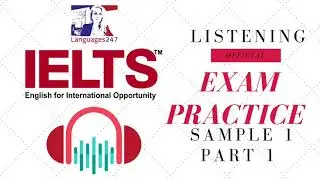Grammar Practice - English Course Lesson 35 - English Grammar Explained. - Present Perfect Simple
In today's grammatical lesson, we will see the use of present perfect simple. So you will know how and when to use it with explanations and examples.
Mastering the language and knowing how to use it easily is one of the objectives of his classes. By learning the basics of English grammar, you will not have the fear of expressing yourself in public. Classes are available for all levels but the goal is the same: to learn English.
Thanks to the Languages247 courses, you can improve in English and you can do it with the help of this course online.
Did you like this video? Do you want to see more videos like this? Love and subscribe to my channel now:
/ @languages247
For more grammar lessons, you can go to: https://www.languages247.com
Do not forget to subscribe to our YouTube channel and follow us on social networks
www.facebook.com/languages247
www.twitter.com/languages247
Lesson 35 - Present Perfect (Simple)
Let’s learn how to form and use the present perfect simple tense!
Form:
Have / Has + past participle
Auxiliary in the present simple + past participle (3rd column of your irregular verbs list)
Affirmative form
I have played
You have eaten
He has lost
She has left
It has fallen
We have driven
You have wanted
They have arrived
I’ve played
You’ve eaten
He’s lost
She’s left
It’s fallen
We’ve driven
You’ve wanted
They’ve arrived
Negative form
I have not played
You have not eaten
He has not lost
She has not left
It has not fallen
We have not driven
You have not wanted
They have not arrived
I haven’t played
You haven’t eaten
He hasn’t lost
She hasn’t left
It hasn’t fallen
We haven’t driven
You haven’t wanted
They haven’t arrived
Interrogative form
Have I lost?
Have you won?
Has he cooked?
Has she written?
Has it arrived?
Have we passed?
Have you wondered?
Have they flown?
Haven’t I lost?
Haven’t you won?
Hasn’t he cooked?
Hasn’t she written?
Hasn’t it arrived?
Haven’t we passed?
Haven’t you wondered?
Haven’t they flown?
Have I not lost?
Have you not won?
Has he not cooked?
Has she not written?
Has it not arrived?
Have we not passed?
Have you not wondered?
Have they not flown?
Some More Examples:
Present Perfect - Examples:
I have finished.
He has arrived.
I haven't taught.
We have not learned.
Have they arrived?
Hasn't she phoned?
Use:
1/ Finished action in the past with result in the present:
She has lost her bag.
I have lost my wallet.
2/ life experiences:
Have you ever been to Japan before?
Has she already tasted your cottage pie?
Have you been to London yet?
Has he visited China?
3/ accomplishments:
Man has walked on the Moon.
Man has built the Great Pyramids.
4/ changes over time:
He has become more confident lately.
We have become more frugal over the last few years.
Your English has improved since last time we met.
Our puppy has grown a lot in the past six months.
5/ multiple actions at different times:
I have watched this movie several times.
She has seen the doctor twice this month.
We have had three exams so far.
Since moving to this city, I have eaten here twice.
6/ unfinished actions - duration from the past until now:
I have lived in Spain for ten years.
I have known him for five years.
He has been teaching English since 2017.
I have had a cold for a week.
7/ Recently completed actions:
I have just received news from them.
It has just arrived through the post.
8/ Uncompleted action that is expected to happen:
She hasn’t given us any homework yet.
He still hasn’t arrived.
We still have not received the parcel.
I haven’t finished eating my lunch yet.
Signal words:
The following signal words / time prepositions / time adverbs are used with the present perfect simple tense:
before/never/up to now /lately/just/already/not yet/how often/until now
Examples:
I have already booked my flight.
I have just spoken to him.
I have been to the States several times before.
I have never seen this film.
I have not spoken with him lately.
Up to now I have never wanted to travel there.
I have not eaten there yet.
How often have you practised this week?
Be careful as this tense is sometimes confused with the past simple or simple past. Here is a quick review of the past simple tense!
Use:
1/ for a finished action
2/ for a certain time in the past
3/ for a specific action or specific event in the past
Signal words that are used with the simple past tense include:
two weeks ago / last month / last week / last year / yesterday / an hour ago / last summer
Examples:
I was on holiday two weeks ago.
Last month I moved house.
They won all the matches last week.
I last went there last year.
I booked my flights yesterday.
I spoke to him an hour ago
I went to the US last summer.
www.languages247.com






![Mining Simulator 2 Auto Mine & Sell, Auto Ore, Pets, Gears, Crates, Quests, TP, etc.[Pipa]](https://pics.providosiki.ru/watch/CA1gYXfv5oM)
























